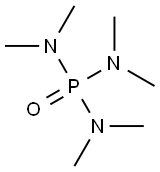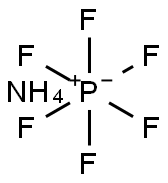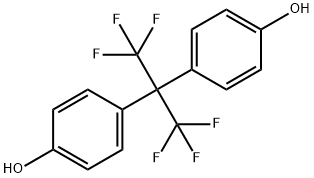Hexamethylphosphoramide
Synonym(s):Hexamethylphosphoric acid triamide;HMPA;Tris(dimethylamino)phosphine oxide
- CAS NO.:680-31-9
- Empirical Formula: C6H18N3OP
- Molecular Weight: 179.2
- MDL number: MFCD00008303
- EINECS: 211-653-8
- SAFETY DATA SHEET (SDS)
- Update Date: 2025-04-30 17:58:12

What is Hexamethylphosphoramide?
Description
Hexamethylphosphoramide (HMPA) is a used occasionally in organic chemistry as a solvent or additive. It is a known carcinogen and is therefore typically avoided when other alternatives exist.
Description
Hexamethylphosphoric triamide is a colorlessliquid with a spicy odor. Molecular weight = 179.24; .Specific gravity (H2O:1l)= 1.03; Boiling point= 232.8℃;FreezingMelting point = 6.1℃; Relative vapor density(air= 1)=6.18; V apor pressure = 0.03 mmHg at 20℃;Flash point= 104.4℃. Hazard Identification (basedonNFPA-704 M Rating System): Health 2, Flammability 1,Reactivity 0. Soluble in water.
Chemical properties
colourless or light amber liquid with an aromatic spicy odour
Chemical properties
Hexamethylphosphoric triamide is a colorless liquid with a spicy odor.
The Uses of Hexamethylphosphoramide
Hexamethylphosphoramide is a dipolar co-solvent and an effective additive used in reactions like reduction of halides, deoxygenation of sulfones, halide olefin couplings and cleavage of carbon-sulfur bond.
The Uses of Hexamethylphosphoramide
Aprotic solvent in organic synthesis. Solvent for polymers, gases; polymerization catalyst; thermal stabilizer in polystyrene; protective additive for polyvinyl and polyolefin resins against uv light degradation. De-icing additive for jet fuels. Chemosterilant for a number of insect pests; chemical mutagen.
The Uses of Hexamethylphosphoramide
Solvent for polymers; polymerization catalyst; stabilizer against thermal degradation in polystyrene; UV stabilizer in polyvinyl and polyolefin resins
Definition
ChEBI: Hexamethylphosphoric triamide is a phosphoramide. It has a role as a mutagen and an insect sterilant.
General Description
Clear colorless to light amber liquid with a spicy odor.
Air & Water Reactions
Water soluble.
Reactivity Profile
Hexamethylphosphoramide may react with strong oxidizing agents and strong acids . Susceptible to formation of highly toxic and flammable phosphine gas in the presence of strong reducing agents such as hydrides. Partial oxidation by oxidizing agents may result in the release of toxic phosphorus oxides.
Hazard
Possible carcinogen. Toxic by skin contact. Combustible.
Health Hazard
The acute toxicity of hexamethylphosphoramide is low. HMPA can cause irritation upon contact with the skin and eyes. Hexamethylphosphoramide has been found to cause cancer in laboratory animals exposed by inhalation and meets the criteria for classification as an OSHA "select carcinogen." Chronic exposure to HMPA can cause damage to the lungs and kidneys. Reproductive effects in male animals treated with hexamethylphosphoramide have been observed. HMPA should be regarded as a substance with poor warning properties.
Fire Hazard
Hexamethylphosphoramide is combustible.
Fire Hazard
Combustible liquid. Its decomposition at high temperatures or in a fire can produce phosphine, phosphorus oxides, and oxides of nitrogen, which are extremely toxic. Carbon dioxide or dry chemical extinguishers should be used for HMPA fires.
Flammability and Explosibility
Combustible liquid. Its decomposition at high temperatures or in a fire can produce phosphine, phosphorus oxides, and oxides of nitrogen, which are extremely toxic. Carbon dioxide or dry chemical extinguishers should be used for HMPA fires.
Potential Exposure
Hexamethylphosphoric triamide is a material possessing unique properties and is widely used as a solvent in small quantities, in organic and organometallic reactions in laboratories. This is the major source of occu pational exposure to HMPA in the United States. It is also used as a processing solvent in the manufacture of aramid fibers. HMPA has been evaluated for use as an ultraviolet light absorber or inhibitor in polyvinylchloride formulations; as an additive for antistatic effects; as a flame retardant; and as a deicing additive for jet fuels. Hexamethylphosphoric triamide has also been extensively investigated as an insect chemosterilant.
First aid
If this chemical gets into the eyes, remove anycontact lenses at once and irrigate immediately for at least15 min, occasionally lifting upper and lower lids. Seek med-ical attention immediately. If this chemical contacts theskin, remove contaminated clothingand wash immediatelywith soap and water. Seek medical attention immediately. Ifthis chemical has been inhaled, remove from exposure,begin rescue breathing (using universal precautions, includ-ing resuscitation mask) if breathing has stopped and CPR ifheart action has stopped. Transfer promptly to a medicalfacility. When this chemical has been swallowed, get medi-cal attention. Give large quantities of water and inducevomiting. Do not make an unconscious person vomit.
Carcinogenicity
Hexamethylphosphoramide is reasonably anticipated to be a human carcinogen based on sufficient evidence of carcinogenicity from studies in experimental animals.
Storage
this compound should be handled only in a fume hood, using appropriate impermeable gloves and splash goggles to prevent skin and eye contact. Containers of this substance should be stored in secondary containers.
Shipping
UN3082 Environmentally hazardous substances, liquid, n.o.s., Hazard class: 9; Labels: 9-Miscellaneous haz ardous material, Technical Name Required
Purification Methods
The industrial synthesis is usually by treatment of POCl3 with excess of dimethylamine in isopropyl ether. Impurities are water, dimethylamine and its hydrochloride. It is purified by refluxing over BaO or CaO at about 4mm pressure in an atmosphere of nitrogen for several hours, then distilled from sodium at the same pressure. The middle fraction (b ca 90o) is collected, refluxed over sodium under reduced pressure under nitrogen and distilled. It is kept in the dark under nitrogen, and stored in solid CO2. It can also be stored over 4A molecular sieves. Alternatively, it is distilled under vacuum from CaH2 at 60o and is crystallised twice in a cold room at 0o, seeding the liquid with crystals obtained by cooling in liquid nitrogen. After about two-thirds are frozen, the remaining liquid is drained off [Fujinaga et al. Pure Appl Chem 44 117 1975]. For tests of purity see Fujinaga et al. in Purification of Solvents, Coetzee Ed., Pergamon Press, Oxford, 1982. For efficiency of desiccants in drying HMPA see Burfield and Smithers [J Org Chem 43 3966 1978, Sammes et al. J Chem Soc, Faraday Trans 1 281 1986]. [Beilstein 4 IV 284.] CARCINOGEN.
Incompatibilities
Incompatible (possibly violent reaction; fire and explosions) with oxidizers (chlorates, nitrates,peroxides, permanganates, perchlorates, chlorine, bromine, fluorine, etc.). Keep away from alkaline materials, chemi cally active metals, strong acids, strong bases.
Waste Disposal
Excess hexamethylphosphoramide and waste material containing this substance should be placed in an appropriate container, clearly labeled, and handled according to your institution's waste disposal guidelines.
Properties of Hexamethylphosphoramide
| Melting point: | 7 °C (lit.) |
| Boiling point: | 230-232 °C/740 mmHg (lit.) |
| Density | 1.03 g/mL at 25 °C (lit.) |
| vapor density | 6.18 (vs air) |
| vapor pressure | 0.07 mm Hg ( 25 °C) |
| refractive index | n |
| Flash point: | 222 °F |
| storage temp. | Inert atmosphere,Room Temperature |
| solubility | Chloroform (Soluble), Methanol (Slightly) |
| appearance | Colorless liquid |
| form | liquid |
| pka | 4.69±0.70(Predicted) |
| color | Colorless to light yellow liquid |
| Odor | Spicy odor (no threshold data) |
| Water Solubility | Miscible |
| FreezingPoint | 7℃ |
| Merck | 14,4725 |
| BRN | 1099903 |
| Dielectric constant | 30.0(20℃) |
| Stability: | Stable. Incompatible with strong acids, strong oxidizing agents. |
| CAS DataBase Reference | 680-31-9(CAS DataBase Reference) |
| IARC | 2B (Vol. 15, Sup 7, 71) 1999 |
| NIST Chemistry Reference | N,N,N',N',N",N'-Hexamethylphosphorotriamide(680-31-9) |
| EPA Substance Registry System | Hexamethylphosphoramide (680-31-9) |
Safety information for Hexamethylphosphoramide
| Signal word | Danger |
| Pictogram(s) |
 Corrosion Corrosives GHS05  Health Hazard GHS08 |
| GHS Hazard Statements |
H314:Skin corrosion/irritation H340:Germ cell mutagenicity H350:Carcinogenicity |
| Precautionary Statement Codes |
P202:Do not handle until all safety precautions have been read and understood. P280:Wear protective gloves/protective clothing/eye protection/face protection. P363:Wash contaminated clothing before reuse. P303+P361+P353:IF ON SKIN (or hair): Remove/Take off Immediately all contaminated clothing. Rinse SKIN with water/shower. P305+P351+P338:IF IN EYES: Rinse cautiously with water for several minutes. Remove contact lenses, if present and easy to do. Continuerinsing. |
Computed Descriptors for Hexamethylphosphoramide
| InChIKey | GNOIPBMMFNIUFM-UHFFFAOYSA-N |
Hexamethylphosphoramide manufacturer
New Products
4,4-Difluoropiperidine hydrochloride tert-butyl 9-methoxy-3-azaspiro[5.5]undecane-3-carboxylate Indole Methyl Resin N-Isopropylurea N,N-Dicyclohexylcarbodiimide(DCC) MELDRUMS ACID 5-METHYLISOXAZOLE-4-CARBOXYLIC ACID Magnessium Bis glycinate Zinc ascorbate 1-bromo-2-butyne 2-acetamidophenol 9(10H)-anthracenone Erythrosin B, 4-Piperidinopiperidine 2-((4-morpholinophenylamino) (methylthio) methylene) malononitrile 2,4-dihydroxybenzaldehyde 3-(4-morpholinophenylamino)-5-amino-1H-pyrazole-4-carbonitrile Methyl 2-methylquinoline-6-carboxylate 2,6-dichloro-4-nitropyridine 4-Bromo-2-chlorobenzonitrile 2-(benzylamino)acetic acid hydrochloride 4-(tert-Butoxycarbonylamino)but- 2-ynoic acid 3,4-dihydro-2H-benzo[b][1,4]dioxepine 1-Phenyl-1-cycloprppanecarboxylicacidRelated products of tetrahydrofuran

![N-(2-Chloro-6-methylphenyl)-2-[(6-chloro-2-methyl-4-pyrimidinyl)amino]-5-thiazolecarboxamide](https://img.chemicalbook.in/CAS/GIF/302964-08-5.gif)






You may like
-
 Hexamethylphosphoramide CAS 680-31-9View Details
Hexamethylphosphoramide CAS 680-31-9View Details
680-31-9 -
 Hexamethylphosphoric Triamide CAS 680-31-9View Details
Hexamethylphosphoric Triamide CAS 680-31-9View Details
680-31-9 -
 Hexamethylphosphoramide, 99% CAS 680-31-9View Details
Hexamethylphosphoramide, 99% CAS 680-31-9View Details
680-31-9 -
 HEXAMETHYLPHOSPHORIC ACID TRIAMIDE CAS 680-31-9View Details
HEXAMETHYLPHOSPHORIC ACID TRIAMIDE CAS 680-31-9View Details
680-31-9 -
 Hexamethylphosphoric acid triamide 98.5% (HMPA) CAS 680-31-9View Details
Hexamethylphosphoric acid triamide 98.5% (HMPA) CAS 680-31-9View Details
680-31-9 -
 Hexamethylphosphoramide CAS 680-31-9View Details
Hexamethylphosphoramide CAS 680-31-9View Details
680-31-9 -
 Hexamethylphosphoramide CAS 680-31-9View Details
Hexamethylphosphoramide CAS 680-31-9View Details
680-31-9 -
 HEXAMETHYLPHOSPHORIC TRIAMIDE INTERMEDIATEView Details
HEXAMETHYLPHOSPHORIC TRIAMIDE INTERMEDIATEView Details
680-31-9
